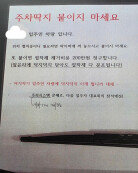Democratic Party’s forceful legislation raises concerns over war of attrition
Democratic Party’s forceful legislation raises concerns over war of attrition
Posted April. 17, 2023 07:57,
Updated April. 17, 2023 07:57
The revision bill of the Grain Management Act, for which South Korean President Yoon Suk Yeol exercised the right to request reconsideration (the veto right), was rejected on Thursday as a result of the National Assembly’s reconsideration. The Democratic Party of Korea attempted to pass the proposal for the nursing act on the same day, whose submission to a plenary session of the National Assembly meeting was delayed by Kim Jin-pyo, the speaker of the National Assembly. If the Democratic Party tried to forcefully pass the law without agreement between the ruling and opposition parties, a similar situation as the Grain Management Act may unfold. If the forceful attempts to pass laws by the majority party, the president’s exercise of the veto rights, and the rejection of re-resolution are repeated, current issues related to the public’s livelihoods may be neglected.
The revision bill of the Grain Management Act passed a plenary meeting of the National Assembly with the Democratic Party’s direct submission at the end of last month, but it returned to the National Assembly as the president vetoed the bill. For the bill to be passed again, more than half of the enrolled members of the National Assembly had to be present and two-thirds of those participating in the meeting had to approve. However, it was short of the quorum despite the Democratic Party’s attempt to resolve the bill in a plenary session again. The party’s floor leader Park Hong-keun said he would not give up. The party is considering proposing the new Grain Management Act that makes mandatory the government’s purchase of leftover rice, which is opposed by the ruling party.
The proposal of the nursing act faces significant differences of opinion between nursing groups and other medical professional groups. Speaker Kim requested the ruling and opposition parties to have discussions and come up with a rational alternative and delayed the voting for the bill to the next plenary session. However, the Democratic Party intends to propose the bill in its original form, which makes it likely to repeat the steps of forceful legislation, the exercise of the veto right, and rejection.
What’s troublesome is this is only the beginning. The opposition party directly submitted the revision bill of the Broadcasting Act, which raises concerns about undermining the governance of public broadcasting, to a plenary session. The ‘yellow envelope act,’ which practically nullifies companies’ right to request compensation for losses caused by illegal strikes, is also expected to be directly submitted. This is why Speaker Kim delayed the processing of the nursing act by saying that he was concerned that more bills were directly submitted.
The Democratic Party does not intend to stop forceful legislation, and the government and the ruling party are not willing to compromise with the opposition party to address the opposition party’s majority status. Social conflicts around the bills are growing amid such a situation. Such a war of attrition, where bills are forcefully passed at the National Assembly by the majority opposition party, the president vetoes the bills, and the opposition party attempts re-resolution and fails, is a waste of national power. The authority of the National Assembly is also lost. Such a legal attrition war is enough with just one experience. Now is the time to return to addressing serious issues with people’s livelihoods.







